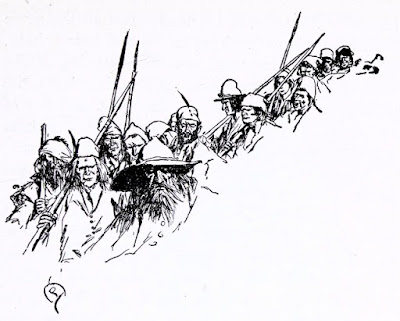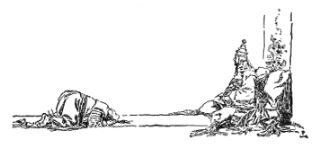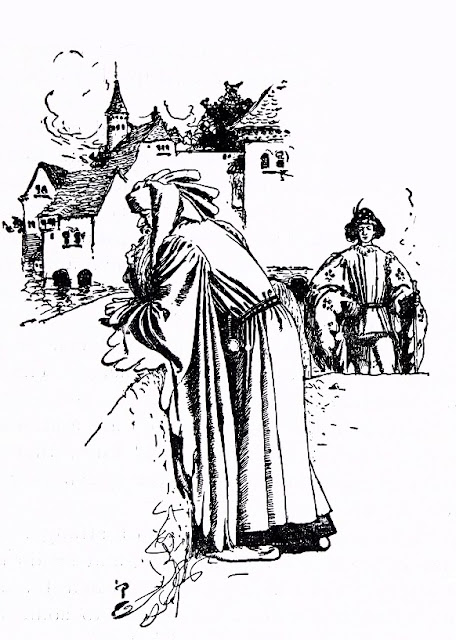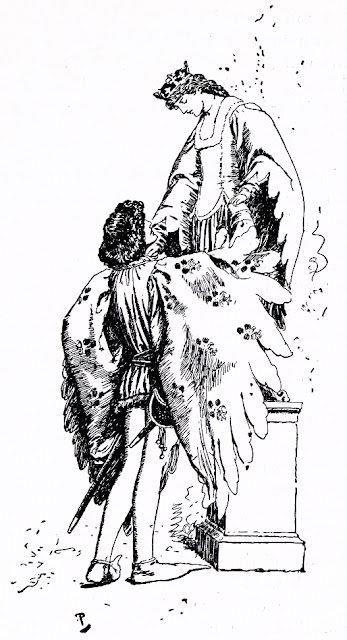
Now it happened that the prime-minister of that country had left an order with the Tailor for a suit of clothes, so the next morning, when the Demon came, the little man set him to work on the bench, with his legs tucked up like a journeyman tailor. “I want,” said he, “such and such a suit of clothes.”
“You shall have them,” said the Demon; and thereupon he began snipping in the air, and cutting most wonderful patterns of silks and satins out of nothing at all, and the little Tailor sat and gaped and stared. Then the Demon began to drive the needle like a spark of fire—the like was never seen in all the seven kingdoms, for the clothes seemed to make themselves.


“What hast thou for me to do?” said the Demon again, and then at last the Tailor found his wits and his tongue from sheer terror. “Look!” said he, “at the great mountain over yonder; remove it, and make in its place a level plain with fields and orchards and gardens.” And he thought to himself when he had spoken, “Surely, even the Demon cannot do that.”
“Yes,” said the Tailor. “It is only a little thing. Here is a hair from my wife’s head; take it and make it straight.”
When the Demon heard what was the task that the Tailor had set him to do he laughed aloud; but that was because he did not know. He took the hair and stroked it between his thumb and finger, and, when he had done, it curled more than ever. Then he looked serious, and slapped it between his palms, and that did not better matters, for it curled as much as ever. Then he frowned, and, began beating the hair with his palm upon his knees, and that only made it worse. All that day he labored and strove at his task trying to make that one little hair straight, and, when the sun set, there was the hair just as crooked as ever. Then, as the great round sun sank red behind the trees, the Demon knew that he was beaten. “I am conquered! I am conquered!” he howled, and flew away, bellowing so dreadfully that all the world trembled.
Upon my word, had a bolt of lightning burst at Jacob Stuck’s feet he could not have been more struck of a heap. For no sooner had he rubbed the glass with his thumb than with a noise like a clap of thunder there instantly stood before him a great, big man, dressed in clothes as red as a flame, and with eyes that shone sparks of fire. It was the Genie of Good Luck. It nearly knocked Jacob Stuck off his feet to see him there so suddenly.
As for the prime-minister, the Genie himself trimmed two locks of hair from him, one from over each of his ears, so that the next morning he looked as shorn as an old sheep.

Dear! dear! how all the town stared with wonder when they saw such a splendid palace standing where the day before had been nothing but naked sand hills! The folk flocked in crowds to see it, and all the country about was alive with people coming and going. As for the king, he could not believe his eyes when he saw it. He stood with the princess and looked and looked. Then came Jacob Stuck. “And now,” said he, “am I to marry the princess?”
“Yes,” cried the king in admiration, “you are!”
She blew her breath upon the piece of blue glass and rubbed her thumb upon it. Instantly, as with a clap of thunder, the great red Genie stood before her, and the poor prime-minister sat shaking and trembling.
“Whosoever hath that piece of blue crystal,” said the Genie, “that one must I obey. What are your orders, O princess?”
“Take this man,” cried the princess, “and carry him away into the desert where you took those other two, and bring my father and Jacob Stuck back again.”
“To hear is to obey,” said the Genie, and instantly he seized the prime-minister, and, in spite of the poor man’s kicks and struggles, snatched him up and flew away with him swifter than the wind. On and on he flew until he had come to the farthest part of the desert, and there sat the king and Jacob Stuck still thinking about things. Down he dropped the prime-minister, up he picked the king and Jacob Stuck, and away he flew swifter than the wind. On and on he flew until he had brought the two back to the palace again; and there sat the princess waiting for them, with the piece of blue crystal in her hand.

You may guess that when the servant understood the talk of the ravens he was not slow in making use of what he heard. Up he scrambled, and away he went as fast as his legs could carry him. On and on he travelled, until he came to[238] the cross-roads and the stone cross of which the raven spoke, and there, sure enough, sat the traveller. He was clad in a weather-stained coat, and he wore dusty boots, and the servant bade him good-morning.
How should the servant know that it was an angel whom he beheld, and not a common wayfarer?
“Whither away, comrade,” asked the traveller.
“Out in the world,” said the servant, “to seek my fortune. And what I want to know is this—will you guide me to where I can find the fruit of happiness?”
Thereupon he drew out his pipes and began to play, and it was such a tune as no man ever listened to before. He played and he played, and, after a while, one after another of those who listened to him began[242] to get drowsy.
When they had come outside of the house, he gathered together a great heap of straw and sticks of wood, and stuffed all under the corner of the house. Then he struck a light and set fire to it, and, as the two walked away through the gray dawn, all was a red blaze behind them.

So poor Abdallah was beaten with rods until he confessed where he had hidden his money; then the Wise Judge handed fifty sequins to Ali and kept twenty himself for his decision, and all went their way praising his justice and judgment.
That is to say, all but poor Abdallah; he went to his home weeping and wailing, and with every[266] one pointing the finger of scorn at him. He was just as poor as ever, and his back was sore with the beating that he had suffered. All that night he continued to weep and wail, and when the morning had come he was weeping and wailing still.

But so soon as he was quite sure that all were really gone, he clambered down as quickly as might be. He waited for a while to make doubly sure that no one was left behind, and then he walked straight up to the rock, just as he had seen the old man do. He plucked a switch from the bush, just as he had seen the old man pluck one, and struck the stone, just as the old man had struck it. “I command thee to open,” said he, “in the name of the red Aldebaran!”
Instantly, as it had done in answer to the old man’s command, there came a creaking and a groaning, and the rock slowly opened like a door, and there was the passageway yawning before him. For a moment or two the fagot-maker hesitated to enter; but all was as still as death, and finally he plucked up courage and went within.
Such a yell as the poor wretch uttered ears never heard before. Over he rolled upon his back and there lay staring with wide eyes, and away scampered the jackass, kicking up his heels and braying so that the leaves of the trees trembled and shook. For no sooner had he lifted the lid than out leaped a great hideous Genie, as black as a coal, with one fiery-red eye in the middle of his forehead that glared and rolled most horribly, and with his hands and feet set with claws, sharp and hooked like the talons of a hawk. Poor Abdallah the fagot-maker lay upon his back staring at the monster with a face as white as wax.

“I would like to have a noble horse to ride upon,” said Abdallah—“a horse such as a king might use.”
“To hear is to obey,” said the Genie; and, stretching out his hand, there stood before Abdallah a magnificent Arab horse, with a saddle and bridle studded with precious stones, and with housings of gold. “Can I do aught to serve my lord further?” said the Genie.
Kneeling before the king, the ambassador touched the ground with his forehead. Then, still kneeling, he unrolled a scroll, written in letters of gold, and from it read the message asking for the princess to wife for the Lord Abdallah.

Well, before he got back to the town he grew hungry, and sat down by the roadside to eat his pie; and if there was ever an angry man in the world before, he was one that day—for there was his pie full of nothing but rusty nails and bits of iron. “This is the way the rich always treat the poor,” said he.
By-and-by he met a poor woman coming home from market. “Would you like to buy a fine fresh loaf of bread?” said the beggar.
“Yes, I would,” said the woman.
“Well, here is one you may have for two pennies,” said the beggar.
At the end of seven days the king called upon the rich man again, and this time he came in his own guise as a real king. “Well,” said he, “is the poor man the richer for his money?”
“No,” said the rich man, “he is not;” and then he told the whole story from beginning to end just as I have told it.
“Your father was right,” said the king; “and what he said was very true—‘Much shall have more and little shall have less.’ Keep the bag of money for yourself, for there Heaven means it to stay.”
One day the weather was cold, and when Babo came home from gathering rushes he found no fire in the house. So off he went to his neighbor the wise man. “Will you give me a live coal to start my fire?” said he.
“Yes, I will do that,” said Simon Agricola; “but how will you carry the coal home?”
“Oh!” said Babo, “I will just take it in my hand.”
“In your hand?”
“In my hand.”
“Can you carry a live coal in your hand?”
“Oh yes!” said Babo; “I can do that easily enough.”
“Well, I should like to see you do it,” said Simon Agricola.
“Then I will show you,” said Babo. He spread a bed of cold, dead ashes upon his palm. “Now,” said he,[315] “I will take the ember upon that.”

When the cook saw what Babo had done, he snatched up the rolling-pin and made at him to pound his head to a jelly. But Babo did not wait for his coming; he jumped out of the window, and away he scampered with the cook at his heels.
Well, the upshot of the business was that Simon Agricola had to go back and bring life to the woman again, or the cook would thump him and Babo both with the rolling-pin. And, what was more, Babo had to pay back the two hundred pennies that the cook had given him for curing his wife.
He built himself a fine house, and by-and-by married the daughter of the new councillor that came after the other one’s head had been chopped off for conspiring against the king’s life. Besides that, he came and went about the king’s castle[334] as he pleased, and the king made much of him. Everybody bowed to him, and all were glad to stop and chat awhile with him when they met him in the street.
So the next day Selim the Fisherman fished and fished and fished and fished, and still he caught no more than the day before; until just at sunset he cast his net for the last time for the day, and, lo and behold! there was something heavy in it. So he dragged it ashore, and what should it be but a leaden box, sealed as tight as wax, and covered with all manner of strange letters and figures. “Here,” said he, “is something to pay for my bread of yesterday, at any rate;” and as he was an honest man, off he marched with it to Selim the Baker.
They opened the box in the baker’s shop, and[340] within they found two rolls of yellow linen. In each of the rolls of linen was another little leaden box: in one was a finger-ring of gold set with a red stone, in the other was a finger-ring of iron set with nothing at all.
Then instantly the gate swung open, and Selim the Baker followed the old man into the garden.
Bang! shut the gate behind him, and there he was.
But he was not dreaming, for it was all as true[346] as that eggs are eggs. So up the hill he rode, and to the grandest and the most splendid of all the splendid palaces, the princes and noblemen riding with him, and the crowd shouting as though to split their throats.And what a palace it was!—as white as snow and painted all inside with gold and blue. All around it were gardens blooming with fruit and flowers, and the like of it mortal man never saw in the world before.
There they made a king of Selim, and put a golden crown on his head; and that is what the Ring of Good Luck can do for a baker.
So that is the way King Selim the Baker began to reign, and that is the way he continued to reign. All day was feasting and drinking and making merry and music and laughing and talking. But every night at midnight the same thing happened: the lights went out, all the people began wailing and crying, and the six tall, terrible black men came with flashing torches and marched King Selim away to the beautiful statue. And every night the same voice said—[350]“Selim! Selim! Selim! What art thou doing? To-day is feasting and drinking and merry-making; but beware of to-morrow!”
First of all, he called the wisest men of the island to him, and found from them just where the other desert island lay upon which the boat with Selim the Baker in it had drifted.
Yes, I am Selim,” said he.
“And do you wear the iron Ring of Wisdom?” said she.
“Yes, I do,” said he; and so he did.
“I have done all this for you!” said Selim the Fisherman.
“And I have been waiting for you a thousand years!” said the beautiful statue—only she was not a statue any longer.
After that they were married, and Selim the Fisherman and the enchanted statue became king and queen in real earnest.
So off he marched without another word. On and on he went along the narrow pathway until at last he came to a little gate of polished brass. Over the gate were written these words, in great letters as red as blood:
“Who Enters here Shall Surely Die.”

The bridegroom winked at him, but said never a word, good or ill, for he was willing to let all that had happened be past and gone. But the king saw how matters stood as clear as daylight,[384] and when he got back home again he had the new words that stood on the walls of the room painted out, and had the old ones painted in in bigger letters than ever:
“All Things are as Fate wills.”
The old man whipped the handkerchief off his eyes, and there the fisherman found himself on the shores of the sea, where there was nothing to be seen but water upon one side and rocks and naked sand upon the other.
“This is the place for you to cast your nets,” said the old magician; “for if we catch nothing here we catch nothing at all.”


The prince had a kind heart, and could not bear to see one in distress; so he spoke to the old man, and asked him his trouble.
“Ah, me!” said the other, “only yesterday I had a son, tall and handsome like yourself. But the queen took him to sup with her, and I am left all alone in my old age, like a tree stripped of leaves and fruit.”
As soon as they had brought him thither they led the prince to a room where was a golden table spread with a snow-white cloth and set with dishes[414] of gold. At the end of the table the queen sat waiting for him, and her face was hidden by a veil of silver gauze. She raised the veil and looked at the prince, and when he saw her face he stood as one wonder-struck, for not only was she so beautiful, but she set a spell upon him with the evil charm of her eyes. No one sat at the table but the queen and the prince, and a score of young pages served them, and sweet music sounded from a curtained gallery.
“Remember,” said she to the prince; and, so saying, clapped the feather cap upon her head. In an instant she herself became an eagle—pied, black and white—and, spreading her wings, leaped into the air.For a while the two eagles circled around and around; but at last they dashed against one another, and, grappling with their talons, tumbled over and over until they struck the ground close to the two who stood looking.
But when the people of that land learned that their youngest princess, and the one whom they loved, had come back again, and that the two sorceresses would trouble them no longer, they [434]shouted and shouted for joy. All the town was hung with flags and illuminated, the fountains ran with wine, and nothing was heard but sounds of rejoicing. In the midst of it all the prince married the princess, and so became the king of that country.
The next morning the young king rode back to his own land, and then sent attendants with horses and splendid clothes, and bade them bring his father and mother to his own home.

































































Keine Kommentare:
Kommentar veröffentlichen